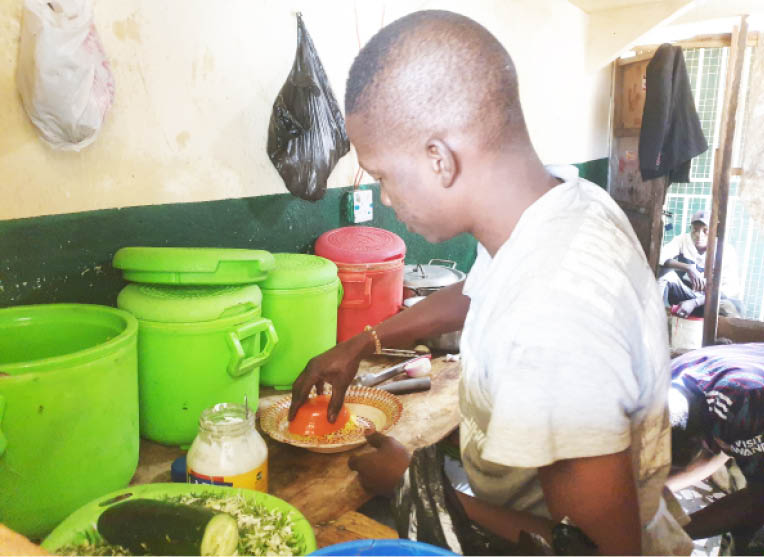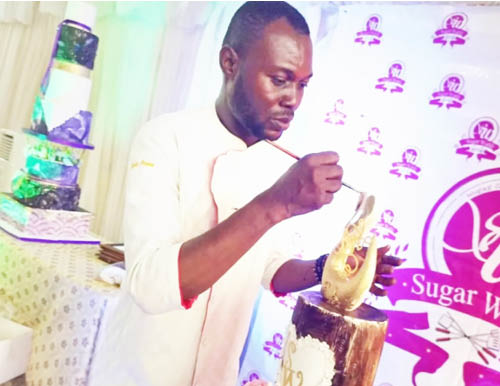How male caterers thrive in Lagos, Kano
The mastery of mixing recipes used to be a ‘woman’s business,’ just like others considered as feminine handiworks like makeup and beauty practices, until men geared up to change the narrative, Daily Trust on Sunday reports. Back in the days, men used to suppress, hide or ignore their culinary skills for fear of being […]

A male caterer in Kano
The mastery of mixing recipes used to be a ‘woman’s business,’ just like others considered as feminine handiworks like makeup and beauty practices, until men geared up to change the narrative, Daily Trust on Sunday reports.
Back in the days, men used to suppress, hide or ignore their culinary skills for fear of being talked down by people. This made a lot of men with the passion for catering take on other businesses, completely ignoring their dreams.
Today, the narrative in the catering industry across Nigeria has been rewritten as many men are now picking up the catering profession and doing excellently at it.
A chat with some male caterers in Lagos metropolis shows how they are thriving in the catering business. These men, whose expertise in the act and art of catering, rival that of the female caterers, explain their passion and modus operandi in the fast growing business.
In a city as trendy as Lagos, where numerous events take place on a daily basis, it is no news that one out of ten families require the services of a caterer for a wedding, birthday, burial, anniversary, house warming, among other functions; not forgetting companies, institutions, SMEs and MMEs, among others. It is safe to say that we all need caterers.
The founder and creative head of a Lagos-based events and catering brand, Endowment Cakes and Event, Victor Eyo Junior, described the catering industry as an innovative one. He said that over the years, the industry had taken a new dimension in terms of output as caterers have taken catering to the level of bringing cakes to life.
Eyo, who has officially been in the business for four years, said he only dealt in confectioneries; he does not cook.
“I have other businesses because in this economy one can’t depend on only one stream of income. So here we do event planning/coordination, as well as decorations and rentals. That way, we keep staying in business,” he said.
Kaduna, Kano top as NAHCON allots hajj seats
Excessive love of wealth: A pivotal factor that triggers individual and societal problems
He further described the industry as a competitive one, saying there are many caterers in the business now – both male and female. However, with grace, honesty and skills, he has been able to thrive and attract more customers.
He said, “So far, so good, it has been awesome. It is a very wide industry. In fact, catering for events as regards styling and coordination has taken an innovative turn, and it keeps improving. I think people prefer to contract male caterers as they are easy to deal with. Being a male caterer has been more of a blessing for me.”

He went on to state that handling a business in Nigeria is not easy, but he has kept his head in the game and has been making profit.
“I have clients all over the country, even outside. People place orders from America, United Kingdom and the likes, for their loved ones back home,” he added.
The chief executive officer of Tony’s Place Kitchen, Tony Okwu, who has been in the business for 8 years, disclosed that though his wife owns a catering brand, he owns a separate brand and decided to stick to cooking alone so as to give it the best of his efforts.
He disclosed that diligence and good customer relations have kept him in business over the years.
“For 8 years I have been in the business and I have always been getting jobs. Once you are good to a customer and you deliver quality as at when due, you will keep getting referrals,” he said.
He added that surviving in business with the downturn in economy and the constant increase in prices of cooking materials makes the business frustrating at times as he doesn’t get the required profit from the business.
“But we are thriving with hard work and consistency. I have been able to manage my brand and cater for my wife and children,” Okwu said.
He further disclosed that over the years, logistics have been the major challenge in dealing with clients outside Lagos.
He added that he had other businesses generating income as catering is seasonal.
In Kano, there are many restaurants and eateries that are currently fully operated by male caterers, an incident that makes it look like a trend. Many of these young and adult men are serving either as owners, managers, attendants, waiters or even those that cook the food. In some instances, people in the state said they preferred food cooked by men because their places are said to be safer and better looking than those by female caterers.
Daily Trust on Sunday gathered that most of the areas in the state where restaurants and local eateries operated by purely men are Zoo Road, one of the most populous and populated area in the state. Others are Beirut Road, Farm Centre, among other notable places.
When our correspondent visited one of these restaurants, 12 Plus Eatery, the owner, Abdurrahman Muhammad Sunusi, disclosed that he started the business as an errand boy in a restaurant and rose to the level of a manager, to the extent that he now owns his own restaurant. He said seven people were working under him and all of them earn a living enough to feed their families.
He said although he had been facing challenges due to the tradition and nature of the society, he has never given up, adding that he has an experience of over 17 years in the sector.
“When I was first taken to the restaurant, I had to shed tears because I saw it as something unusual and not reliable. But because I was an orphan, I had no option than to accept it. I started as an errand boy and moved up to the level of a manager of the restaurant. To cut the story short, presently, this restaurant is my own and I doubt if I can change to any other business. This is what I know the whole of my life,” he said.
Speaking on how he is running the restaurant, Sunusi said he was far more experienced and mastered cooking more than the women, and noting that majority of his customers are women.
“Honestly speaking, any woman that eats from our restaurant would love to come back. There was a time one woman dragged her husband here and requested that we should teach her how to cook because he was always buying from us.
“In a day, we used to receive 50 to 70 people, but 70 per cent of them are women,” he said.
He said that every morning, his boys would come out and prepare the place, while he would go to the market to get some stuff that cannot be preserved. From there, he moves to the restaurant and prepares the food as usual. And that by 10:00am their food is ready, up to 10:00pm.
“I built my house, got married. Two of my seven employees are married with children,” he added.
He further said one of the challenges they faced in the business was how the society perceived men – as effeminate or cross-dressers – which poses a great danger to them. He said the challenge was to the extent that they were rejected by women or their parents if they want to marry.
He said another challenge was how to establish the restaurant and make it grow, especially considering the rising cost of foodstuff. “You have to run at a loss severally before your customers locate you. Many restaurants were opened and later had to close. But we thank God that we have survived to this level.
“I hope to open more branches for some of my boys in the near future so that I can employ more people,” he said.
In another big restaurant in the state, Shaba’an Restaurant, more than 20 people work in various segments of the restaurant and they are all males.
According to their manager, Jamilu Shehu, the restaurant, which operates for 24 hours every week, said although their customers are mostly male, the females are coming and have expressed satisfaction with the way they are running the place.
“This restaurant is purely run by male, including those that cook the food. We to receive over 200 customers in a day; this is asides the orders we get from organisations,” he said.
In an interaction with a female customer in one of the restaurants, Abiha Lawal said she enjoyed the food cooked by the males more than that of females.
She said one of the reasons she patronises them is how they are organised and sanitised more than the females, adding, “Even the way they follow the guidelines in cooking is different from us. Honestly, I prefer their food; that is why every day I buy twice from this restaurant.”
